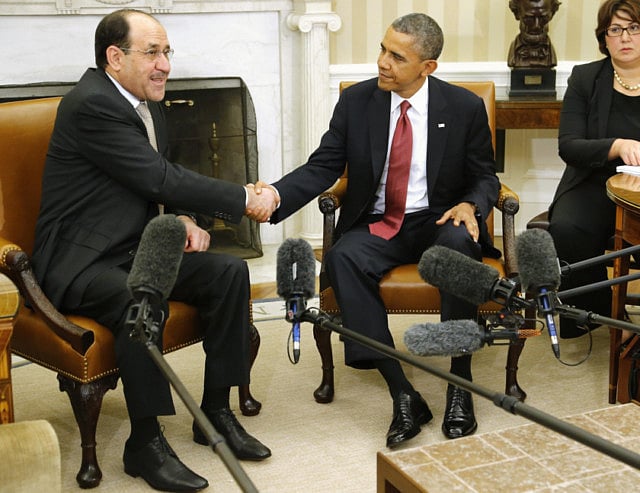Washington: With violence spiking again in Iraq, fomenting fears of widening instability in the region, Prime Minister Nouri Al Maliki pressed President Barack Obama on Friday for American help in fighting Al Qaida terrorists in his country’s lawless west.
Al Maliki said the Iraqi government was “mobilising our people in order to fight Al Qaida because it’s good for Iraq and the Middle East”.
Speaking after a meeting with the president in the Oval Office, Al Maliki said he and Obama had “similar ideas” on counterterrorism priorities, though he did not offer details on any requests for military equipment or other aid.
Other Iraqi officials said the government was appealing for a range of aid, including Apache helicopter gunships and Hellfire missiles, as well as more US intelligence and other forms of counterterrorism support, like reconnaissance drones that would be operated by Americans.
“Unfortunately, Al Qaida has still been active and has grown more active recently,” Obama acknowledged, adding, “We had a lot of discussion about how we can work together to push back against that terrorist organisation that operates not only in Iraq but also poses a threat to the entire region and to the United States.”
Al Maliki’s visit was his first to the White House since December 2011, and the changes since that last trip were stark.
At the end of 2011, the US was withdrawing the last of its soldiers after nearly nine years of war, and he and Obama were inaugurating a new relationship. Now, coordinated bombings regularly rip through Iraqi cities as sectarian tensions increase and Al Maliki’s government battles a resurgent Al Qaida in Iraq, which US officials say is building camps, training facilities and staging areas in western Iraq.
The political and security setbacks have put both leaders in an awkward position. Obama, who two years ago hailed the reduction in violence and praised Al Maliki for leading “Iraq’s most inclusive government yet,” is eager to focus on other priorities.
Al Maliki, who pushed for the US withdrawal and has tried to keep his distance from Washington, finds himself having to ask the president for help.
The changed circumstances were evident in the White House’s decision to forgo a joint news conference like the one it held the last time Al Maliki visited. Instead, the two leaders made only brief remarks in the Oval Office.
“It’s hard for the administration to make any claims that things have gone well inside Iraq,” said Brian Katulis, a senior fellow and expert on Iraq at the Centre for American Progress. “But the blame for that falls largely on Iraq’s leadership.”
Still, Katulis said the administration recognized it would need to keep a focus on Iraq, not least because the rise of Al Qaida in western Iraq could worsen the civil war in Syria, with terrorists moving back and forth across the porous border between the countries.
“There’s recognition that if Syria continues on current trends, you’re going to need to be more involved in Iraq,” he said.
Obama said he and Al Maliki spent much of their meeting discussing Syria, and the two seemed more in sync on strategies there than in 2011.
Both endorsed the diplomatic effort aimed at finding a political transition in Syria. Two years ago, Al Maliki refused to back Obama’s call for sanctions and for Syria’s president, Bashar Al Assad, to step down.
A joint statement issued after the meeting Friday said Iraqi officials had presented a new five-year, $357 billion (Dh1.3 trillion) plan to revitalise their energy industry, which involves building new pipelines. The plan is extraordinarily ambitious, and given that Iraq’s entire government budget in 2012 was $100 billion, it left some analysts shaking their heads.
“I don’t know where they’re coming up with the money,” said Ramzy Mardini, an adjunct fellow at the Iraq Institute for Strategic Studies in Beirut. “The pipelines they want to build would go through regions where they don’t have adequate security.”
The Iraqi request for aid is coming at time when Al Qaida forces are outgunning Iraqi troops.
“Some of these Al Qaida networks that are coming in from Syria and that are based in Iraq now really have heavy weapons,” a senior administration official told reporters in a conference call Wednesday.
“Iraqi helicopter pilots that we have trained have been killed by heavy machine gun weaponry,” said the official, who spoke on the condition of anonymity to characterise the private diplomatic exchanges. “And so they’re trying to take this threat - take on this threat - with equipment that isn’t really geared toward doing it effectively.”
US intelligence and counter-terrorism officials say they have mapped the locations and origins of new terrorist networks and are sharing that information with the Iraqis. But Al Maliki has sent contradictory signals in response to US offers in the past two years to enhance intelligence-sharing operations or to send targeting analysts.
Analysts also said Al Maliki continued to emphasise big-ticket items, like F-16 fighter jets, that are better suited to lending his government symbolic power in the region than to rooting out Al Qaida camps.
Sign up for the Daily Briefing
Get the latest news and updates straight to your inbox
Network Links
GN StoreDownload our app
© Al Nisr Publishing LLC 2026. All rights reserved.
